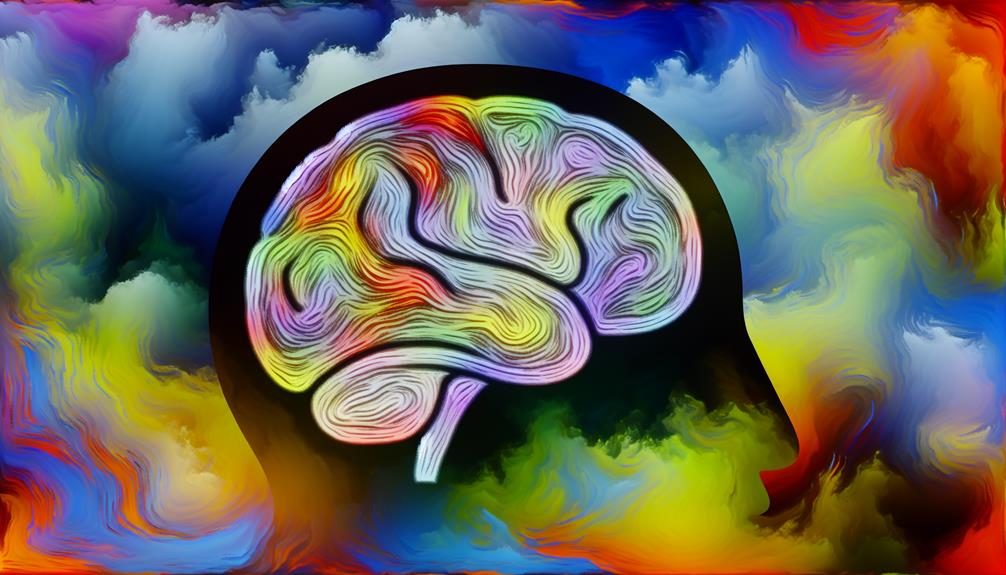You might think of depression as just a feeling, but it's actually a complex condition influenced by a range of factors. From biological imbalances in your brain to genetic predispositions that might run in your family, the causes are anything but straightforward. Environmental influences and psychological triggers also play significant roles, shaping how you experience this disorder. As you consider these different angles, it's worth asking: what specific elements might be at play in your own life? The answers may reveal more than you expect.
Contents
Biological Factors
When considering the biological factors behind depression, it is vital to recognize that our brains are complex organs influenced by a variety of elements. One significant aspect is hormonal fluctuations, which can profoundly impact your mood and emotional well-being. For instance, changes in hormone levels during puberty, menstruation, pregnancy, and menopause can trigger depressive episodes in some individuals. These fluctuations can lead to alterations in neurotransmitter systems, specifically those involving serotonin and dopamine, which play essential roles in regulating mood.
Additionally, brain structure is another key factor. Research shows that certain areas of the brain, such as the prefrontal cortex and hippocampus, may be smaller in individuals suffering from depression. This structural change can affect cognitive functions and emotional regulation, making it harder for you to cope with stress and negative emotions. Neuroimaging studies have identified these alterations, indicating that the way your brain is wired can influence your vulnerability to depression.
Understanding these biological factors emphasizes the importance of a detailed approach to treatment. It's not just about addressing emotional symptoms; recognizing how hormonal changes and brain structure contribute to your mental health can lead to more effective interventions. Whether it's through medication, therapy, or lifestyle changes, knowing these underlying factors can empower you to seek the help you need, fostering a deeper understanding of your condition and paving the way for recovery.
Genetic Predisposition
When you consider the role of genetic predisposition in depression, it is crucial to recognize how family history can influence your risk. Research has identified specific genetic markers that may contribute to this mental health condition, often linked to neurotransmitter imbalances. Understanding these connections can provide valuable insight into your own experiences and those of your loved ones.
Family History Influence
How much does your family history play a role in your mental health? It's crucial to understand that family relationships and dynamics can greatly influence your emotional well-being. Various factors come into play, including:
- Parenting styles: The methods and approaches your caregivers used can shape your emotional responses.
- Sibling rivalry: Competition among siblings can lead to feelings of inadequacy or anxiety.
- Familial support: A supportive family network can foster resilience against mental health issues.
- Family trauma: Traumatic experiences within the family can leave lasting emotional scars.
Inherited traits also contribute to how you handle stress and emotions. Communication patterns within your family can either promote healthy dialogue or create barriers that hinder emotional bonding. Moreover, cultural heritage and shared values may shape how mental health is perceived and addressed in your family.
Being aware of these influences allows you to better understand your mental health landscape. While you can't change your family history, recognizing its impact can empower you to seek healthier relationships and coping mechanisms, promoting a more balanced emotional state.
Genetic Markers Identified
Recent research has illuminated the role of genetic markers in the predisposition to depression, revealing that your genetic makeup can greatly influence your vulnerability to this mental health condition. Genetic testing has become a valuable tool in biomarker discovery, allowing for the identification of hereditary factors that may increase your risk. Through population studies, scientists have observed specific gene expression patterns linked to depression, which can help in risk assessment for those with a family history.
Moreover, epigenetic influences play an essential role in how these genetic markers manifest. Your environment and experiences can modify gene expression, potentially activating or silencing genes associated with depression. Familial traits often reflect this complex interplay, suggesting that if depression runs in your family, the genetic predisposition may be compounded by shared environmental factors.
Understanding these genetic markers can empower you with knowledge about your mental health. While having a genetic predisposition doesn't guarantee you'll develop depression, it does provide insights into the biological underpinnings of the condition, paving the way for more targeted interventions and support strategies. Recognizing these factors can be an important step in managing your mental health proactively.
Neurotransmitter Imbalance Role
What happens in the brain when neurotransmitter imbalances occur? You may experience disruptions in emotional response and mood regulation. Key neurotransmitters such as serotonin and dopamine play essential roles in maintaining healthy brain chemistry. A serotonin deficiency can lead to mood disorders, while impaired dopamine regulation affects motivation and pleasure, creating a chemical imbalance that can be detrimental to your mental health.
Consider the following elements impacted by neurotransmitter interaction:
- Synaptic transmission: Affects how signals are sent between nerve cells.
- Emotional response: Influences how you react to everyday situations.
- Mood disorders: Increases vulnerability to conditions like depression and anxiety.
- Neurotransmitter therapy: A potential treatment to help restore balance.
When neurotransmitters don't function properly, it can lead to significant challenges in daily life. Understanding these mechanisms can empower you to seek help and explore treatment options like neurotransmitter therapy. By addressing these imbalances, you can take steps toward enhancing your mental health and overall well-being. Remember, acknowledging the role of neurotransmitters is essential in the journey to recovery.
Environmental Influences

Environmental influences can markedly shape your mental health, often intertwining with genetic factors. Your socioeconomic status, family dynamics, and the presence of community support systems all play vital roles in either mitigating or exacerbating feelings of depression. Understanding these factors can help you identify areas of your life that might need attention or improvement.
Socioeconomic Status Impact
Socioeconomic status (SES) plays a significant role in the prevalence and severity of depression, affecting millions worldwide. When you're maneuvering through life with low SES, the weight of various stressors can intensify feelings of hopelessness. Here are some critical factors that often contribute to this struggle:
- Financial stress from low wages or job loss can create an unending cycle of anxiety.
- Educational attainment often correlates with better job opportunities, but lack of access can hinder your social mobility.
- Housing instability leaves you vulnerable, affecting your mental well-being and sense of security.
- Access to healthcare is limited, making it difficult for you to seek help when needed.
The intersection of these elements often perpetuates poverty cycles, leading to feelings of isolation and despair. Economic inequality exacerbates these issues, as communities with fewer resources may lack adequate mental health support. Unemployment effects can further deepen depression, as the challenge of securing stable employment weighs heavily. Ultimately, understanding how SES impacts depression can help in addressing these complex issues and promoting access to essential community resources for those in need.
Family Dynamics Role
In the context of mental health, family dynamics hold considerable significance in shaping an individual's experience with depression. Your interactions within the family can influence your emotional well-being. For instance, communication patterns affect how issues are addressed, while parenting styles can shape your attachment styles, impacting your emotional regulation.
The quality of sibling relationships also plays a role; supportive siblings can provide emotional support and aid in conflict resolution, whereas competitive or neglectful dynamics might exacerbate feelings of isolation. Family traditions and role modeling set the foundation for coping mechanisms and resilience.
Here's a table summarizing these concepts:
| Factor | Positive Impact | Negative Impact |
|---|---|---|
| Communication Patterns | Open dialogue fosters trust | Poor communication leads to misunderstanding |
| Parenting Styles | Supportive parenting encourages independence | Authoritarian styles can cause anxiety |
| Sibling Relationships | Close bonds enhance emotional support | Rivalry creates additional stress |
| Family Traditions | Shared activities build connections | Rigid traditions may impose undue pressure |
Understanding these dynamics can help you recognize their influence on depression and seek healthier patterns. The goal is to foster a nurturing environment that promotes emotional well-being.
Community Support Systems
Throughout your life, community support systems play an essential role in shaping mental health, particularly when it comes to managing depression. These systems can provide invaluable resources and connections that help you navigate the complexities of your mental health. Engaging with support networks can foster resilience and provide a sense of belonging.
Consider the following elements of a robust community support system:
- Peer support programs that offer shared experiences and understanding.
- Community outreach initiatives that connect you with local resources.
- Group therapy sessions that facilitate open dialogue and shared healing.
- Volunteer opportunities that create a sense of purpose and community engagement.
Research shows that strong social connections can greatly reduce feelings of isolation and improve overall well-being. By participating in these local resources, you can enhance your mental health and develop meaningful relationships. Remember, reaching out for support isn't a sign of weakness; it's a proactive step toward recovery. Building a network of friends and professionals can empower you to face depression with renewed strength and hope. The road to healing is often easier when you're not walking it alone.
Psychological Triggers
Certain psychological triggers can significantly impact an individual's mental health, often leading to the onset or exacerbation of depression. You may find that cognitive distortions play an important role, as they can skew your perception of reality, making situations seem worse than they are. This negative self-talk can perpetuate feelings of worthlessness and hopelessness, contributing to an emotional dysregulation that complicates your ability to cope with stress.
Traumatic experiences, whether recent or from the past, can also serve as powerful triggers. Such events might leave you grappling with attachment issues, affecting how you relate to others and how secure you feel in relationships. If you've experienced past abuse, it could manifest in heightened anxiety and emotional turmoil, further straining your mental well-being.
Your personality traits may also influence your susceptibility to depression. For instance, if you're prone to perfectionism or have a tendency to ruminate, your stress response can become heightened, making it difficult to manage daily challenges. During existential crises, these psychological triggers can intensify, leading you to question your purpose and place in the world.
Recognizing and understanding these psychological triggers is essential. Developing effective coping mechanisms can help you manage your emotional responses and mitigate the impact of these triggers on your mental health. By addressing these underlying factors, you can pave the way toward healing and resilience.
Social and Cultural Aspects

Social and cultural aspects play an essential role in shaping your experience of depression. Your mental health can be markedly influenced by the social environment you're in and the cultural context that surrounds you. Factors like peer relationships and familial roles can either support or exacerbate feelings of isolation and despair.
Consider how the following elements might impact your mental health:
- Cultural stigma: Societal views on mental health can lead to feelings of shame and reluctance to seek help.
- Social isolation: Limited social interactions can intensify feelings of loneliness, making it harder to cope.
- Community engagement: Active participation in community activities can foster a sense of belonging, countering feelings of alienation.
- Media influence: The portrayal of mental health issues in media can shape your perceptions and attitudes toward seeking help.
Identity factors and group dynamics also play a vital role. Cultural expectations can pressure you to conform, often conflicting with your personal struggles. This tension may lead to further emotional distress. On the other hand, robust social support systems can provide a buffer against depression, offering you understanding and connection in challenging times.
Ultimately, recognizing how these social and cultural aspects intertwine with your mental health is essential. By understanding these influences, you can better navigate your path toward healing and seek the support you need.
Lifestyle Choices
While various factors contribute to depression, lifestyle choices can greatly impact your mental health. Poor dietary habits, such as excessive sugar and processed foods, can lead to inflammation and contribute to depressive symptoms. Conversely, a balanced diet rich in fruits, vegetables, and whole grains can enhance your mood and energy levels. Regular exercise routines are equally important; studies show that physical activity releases endorphins, which can alleviate feelings of sadness and anxiety.
Sleep patterns also play a significant role. Inadequate or disrupted sleep can exacerbate depressive symptoms, making it important to establish a consistent sleep schedule. Similarly, social interactions are crucial for emotional well-being. Isolation can deepen feelings of loneliness and despair, so nurturing relationships is important.
Stress management techniques, including mindfulness practices and recreational activities, can help you cope with life's pressures. Engaging in hobbies you enjoy can serve as a natural antidepressant, providing both distraction and fulfillment.
Additionally, consider your work-life balance. Chronic stress from overwork can lead to burnout, which greatly impacts your mental state. It's important to set boundaries and prioritize self-care.
Lastly, be mindful of your substance use. Alcohol and drugs may offer temporary relief but often worsen depression in the long run. By consciously evaluating these lifestyle choices, you can create a foundation for improved mental health and resilience against depression.
Neurotransmitter Imbalance

When neurotransmitters in the brain become imbalanced, it can greatly influence your mood and emotional state. These chemical messengers play a vital role in mood regulation, affecting everything from your happiness to your ability to cope with stress. Imbalances can disrupt neurotransmitter pathways and lead to conditions such as depression.
Key factors that contribute to neurotransmitter imbalance include:
- Low serotonin levels, which can result in feelings of sadness and anxiety.
- Impaired dopamine function, affecting motivation and pleasure.
- Hormonal interactions, which can alter neurotransmitter synthesis and availability.
- Dysregulated neurotransmitter receptors, disrupting synaptic transmission and communication between neurons.
When these factors collide, brain chemistry becomes altered, creating a chemical imbalance that can manifest as depressive symptoms. For instance, low serotonin levels are commonly linked with mood disorders, while insufficient dopamine function can lead to a lack of enjoyment in activities you once loved. The intricate interplay between different neurotransmitters and their receptors underscores the complexity of mood regulation.
It's essential to understand that neurotransmitter imbalances can stem from various sources, including genetics, lifestyle choices, and environmental stressors. Addressing these imbalances often requires a thorough approach, incorporating lifestyle changes, therapy, and sometimes medication to restore chemical balance and improve overall mental health. By recognizing the signs of neurotransmitter imbalance, you can take proactive steps toward finding balance and enhancing your emotional well-being.
Frequently Asked Questions
Can Diet Impact the Severity of Depression Symptoms?
Yes, your diet can greatly impact the severity of depression symptoms. Nutrient deficiencies and poor gut health can exacerbate feelings of sadness, so focusing on a balanced diet may help improve your overall mental well-being.
How Does Sleep Quality Affect Depression Risk?
Studies show that 90% of individuals with depression experience sleep disorders. Poor sleep quality and sleep deprivation can greatly increase your risk of depression, affecting mood regulation, cognitive function, and overall mental health. Prioritize restorative sleep.
Are There Certain Medications That Can Worsen Depression?
Yes, certain medications can worsen depression. Medication side effects, like fatigue or mood changes, may contribute. Additionally, antidepressant withdrawal can lead to increased depressive symptoms, making it essential to consult your doctor for guidance.
Can Depression Be Mistaken for Other Mental Health Issues?
Did you know about 50% of people with depression also experience anxiety? This symptom overlap complicates diagnosis, increasing misdiagnosis risks. Emotional fatigue and co-occurring disorders highlight the importance of thorough psychological assessments to guarantee effective treatment and reduce stigma issues.
What Role Does Exercise Play in Managing Depression?
Exercise plays an essential role in managing depression. Engaging in regular physical activity boosts mood, enhances self-esteem, and reduces anxiety. The exercise benefits include releasing endorphins, which can greatly improve your overall mental health.
Conclusion
To sum up, understanding what causes depression is like piecing together a mind-boggling puzzle where every piece matters immensely. It's not just a simple mood swing; it's a whirlwind of biological, genetic, and environmental factors colliding with psychological triggers. You're not alone in this chaotic storm—countless others navigate similar challenges. By embracing a multifaceted approach to treatment, we can illuminate the path toward healing, empowering you to reclaim joy and resilience in your life like a phoenix rising from the ashes.
